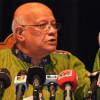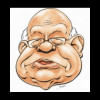Banks to lower interest rates
♦ Finance minister says lending rate cut to help increase investment
♦ Economists hail decision but express doubt about implementation
Both public and private banks have decided to lower lending rates to single digits from July 1 -- a move that comes weeks after the government showered them with a raft of privileges, drawing criticism from different quarters.
There will also be a cap on the deposit rates so that those remain in tune with the lending rates. Private banks have set the deposit rates at 6 percent while the public ones are yet to decide on it.
Lauding the decisions made at two separate meetings yesterday, Finance Minister AMA Muhith said this would help boost investment.
A number of economists have also welcomed the move but cast doubts on its implementation. They also pointed out that the cut in deposit rates will affect savers.
The finance minister, at a meeting at his secretariat office, directed the chief executives of state-owned banks to keep the lending rates below 10 percent.
Bangladesh Bank Governor Fazle Kabir was also present there.
Talking to reporters later, Muhith said the prime minister had given instructions that the lending rates should not be such that they discourage investment.
“That is the message we gave them,” he said.
The minister further said the banks were told to keep lending rates around 10 percent and not to increase deposit rates.
According to meeting sources, the officials of the state banks told the minister that the government should fix the interest rates on government deposits with the banks, and also reduce the interest rates of up to 11 percent on savings instruments.
At a separate meeting, the owners of private commercial banks decided to bring down the lending rate to 9 percent and deposit rate to 6 percent from next month.
The decision came at an emergency meeting of Bangladesh Association of Banks (BAB) in the capital.
“We have decided to lend at an interest rate of 9 percent and take deposits with 6 percent interest for a period of three months from July 1,” BAB Chairman Nazrul Islam Mazumder told reporters later.
Currently, private banks' lending rates hover between 10 and 16 percent while savings deposit rates are below 6 percent. But the fixed deposit rates on schemes for three months to three years are between 5 and 10 percent. The rates are above 10 percent in a few banks.
However, interest rates on all types of deposit schemes in state banks are between 3 percent and 6 percent. Their lending rates vary from 11 percent to 13 percent.
Nazrul said the PM fulfilled all the demands from the bank owners through an amendment to the Bank Companies Act.
“Everyone should agree with the decision to reduce lending rates to single digits as per the prime minister's instructions,” he told the meeting.
“I talked to the [Bangladesh Bank] governor today [Wednesday] over the phone. He said the inflation rate is 5.8 percent. So, we decided to fix the deposit rate at 6 percent, above the inflation rate,” said Nazrul, also chairman of Exim Bank.
Many insurance and leasing companies offer deposit rates of more than 12 percent. This must stop, otherwise, depositors will move to those companies, he added.
Bank Asia Chairman A Rouf Chowdhury said the interest rate on loans is very low in other countries.
“We will have to bring down the lending rates,” he told the meeting, adding that the main problem of the banking sector is high volume of defaulted loans.
Moshiur Rahman Chowdhury, managing director of AB Bank, said, “It is final that the interest rates will be at single digits but sector-wise loan rates will be set by top executives at another meeting.”
The Association of Bankers Bangladesh, a forum of the chief executives of banks, will hold a meeting soon to fix the sector-wise lending rates, he said.
Asked about the moves by the government and the bank owners, Ahsan H Mansur, executive director of the Policy Research Institute of Bangladesh, said, “This is an attempt to influence public opinion to justify the privileges, including reduction in corporate tax, which have been given to the bank owners.
“It was just a voluntary announcement ... there is no monitoring and enforcement mechanism,” said Ahsan, also former economist at the International Monetary Fund.
Banks will not be able to implement the decisions because they did not devise any mechanism on how the rate will be brought down to 9 percent. Besides, they will not get deposits at 6 percent interest until the interest rates on savings instruments are reduced from 11 percent,” he mentioned.
He also said the government can come up with a provision that those banks, which will be able to bring down lending rates, will enjoy reduction in tax.
Talking to this correspondent, AB Mirza Azizul Islam, former adviser to a caretaker government, said it will be good if banks can implement the decisions.
“But depositors will be hurt if interest rates on deposits are brought down,” he added.
Zahid Hussain, lead economist at the World Bank's Dhaka office, said, “This is a welcome move if it can be implemented.”
He, however, wondered how banks will manage to remain profitable if the spread is down to 3 percent without addressing the problem of non-performing loans.
“I will, therefore, believe it when I see it because the devil is always in the details of implementation.”
Over the last three months, using the excuse of solving the liquidity crisis in banks, Muhith took several steps whose true beneficiaries were just the bank owners.
The latest in the line of mercies came in the proposed budget in the form of a slash in corporate tax for banks and financial institutions by 2.5 percentage points in fiscal 2018-19.
The move will cost the government around Tk 1,000 crore in lost revenues, said a high official of the National Board of Revenue.
Earlier, the BB slashed the repo rate by 75 basis points to 6 percent, making funds cheaper for banks. Repo is a short-term fund that the central bank gives to banks in case of cash shortfall.
It also cut the cash reserve ratio by one percentage point to 5.5 percent.
A number of economists had then said the moves would make funds cheaper for banks. And the excess money supply would increase defaulted loans further as many banks frequently breach the rules and regulations while sanctioning loans.
The finance ministry also issued a notice clearing the way for private banks to keep 50 percent of the government funds.
Previously, private banks could hold 20 percent of the funds for Annual Development Programme and 25 percent from the revenue budget.
At that time, Muhith had said the steps would bring down the interest rates on loans to single digits in one month. The banks' lending rates, however, are yet to come down.
In recent years, the banking sector has been struggling to survive from the rising defaulted loans, capital shortfall and financial scams that emerged mainly from corruption and a lack of corporate governance.
In addition to this, some banks are now facing liquidity crisis, which has led to a rise in interest rates on loans by 2 to 4 percentage points.

 For all latest news, follow The Daily Star's Google News channel.
For all latest news, follow The Daily Star's Google News channel. 








Comments